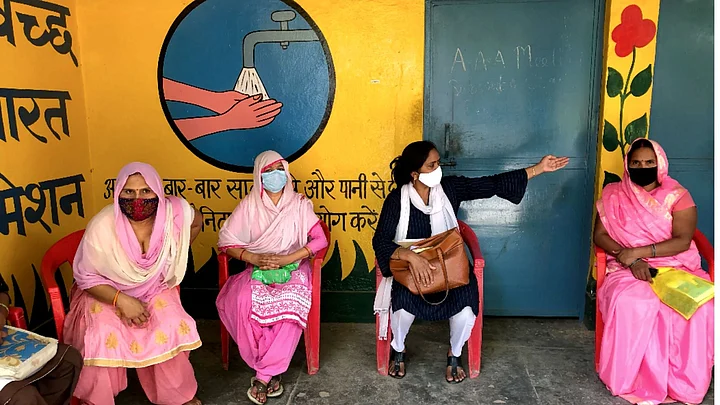Sunita, 32, works as an Accredited Social Health Activist (ASHA) in Gagol village in Meerut district of Uttar Pradesh. Having worked throughout the COVID-19 pandemic by going door-to-door for contact tracing, she says that her incentive of Rs 1,000 per month is much less than what she deserves.
“We are risking our and our family’s health by going door-to-door during a pandemic, but all we get in return is a COVID allowance of Rs 1,000 per month, and sometimes even that is delayed.”Sunita, ASHA Worker
Sunita’s sentiment is echoed by several other ASHA workers in the village. Many of them tell The Quint that they feel underpaid, overworked and left out by the administration, despite being a crucial link between India’s rural community and healthcare system.
Running Door-To-Door For Contact Tracing, How Much Do ASHAs Earn?
Having been at the forefront of India’s war against malnutrition, polio and several other health-related problems on ground, in 2020, approximately 9 lakh ASHA workers joined the country’s fight against the coronavirus pandemic – distributing ration, helping in contact tracing, and spreading awareness around the virus.
However, despite being first in line of India’s defence against the virus, these women remain one of the most poorly paid communities of health workers, mostly because their work is considered to be voluntary and part-time.
On an average, an ASHA worker’s monthly income varies from Rs 2,000 per month to Rs 5,000 per month, depending on the state they are based out of. Most of their income is in the form of incentives. They get Rs 75 for full immunisation, Rs 40 for reporting child death, and Rs 300-600 for accompanying a pregnant woman to hospital.
“We are paid Rs 600 when a pregnant woman we took to a government hospital, gives birth to a baby. It’s contractual labour,” says Dharamvati, another ASHA worker from Meerut’s Gagol village. “However, if something goes wrong during child birth or if the woman shifts to a private hospital during those nine months, we lose out on this money as well,” she adds.
Dharamvati started working as an ASHA in 2018. She feels that their total income doesn’t do justice to the work they do.
“Even a daily wager around here earns approximately Rs 400-500 per day. We get Rs 1,000 per month for our COVID-related services. That amounts to Rs 30-35 a day. You tell me, is that enough?”Dharamvati, ASHA worker in Gagol, Meerut
‘They Slam Doors on Our Faces’
The ASHA community was constituted by the Ministry of Health and Family Welfare under the National Rural Health Mission in 2006. Selected from the village, an ASHA is accountable to it.
However, both Sunita and Dharamvati tell us about instances when people in their villages slammed doors on their face as they went for contact tracing during the pandemic.
“There’s a patient in every house, but they don’t want to tell us. In fact, when we go to their homes to distribute medicines or conduct surveys, they slam doors on our face,” says Sunita.
Dharamvati adds that it is only after the condition of a patient worsens that the blame falls on them for not having taken note of the problem earlier.
Most ASHA workers going out on field during COVID-19 are also shunned in their neighbourhoods as people suspect them of being carriers of the virus.
‘Need a More Institutionalised Approach’
Epidemiologist and public health expert, Chandrakant Lahariya, told The Quint that during the pandemic, with contact tracing and COVID surveys on their checklist, the work of an ASHA worker has increased manifold, however their problems are not limited to low income.
“The problem isn’t just that they are not get paid enough for their job, that’s obviously there, but the bigger issue is that they don’t get any protective gear or other benefits accorded by the state to other frontline workers. Further, they sometimes have to face verbal and physical abuse at the hands of people because of the stigma attached with the virus.”Chandrakant Lahariya, Epidemiologist & Public Health Expert
Lahariya further added that the solution to these problems of ASHA workers lies in an institutionalised approach towards them instead of the current ad hoc approach. “We need to define the role of an ASHA and institutionalise their work with government providing them benefits like an insurance cover and honorarium. At present, ASHAs are hired and paid as per the need of a particular assignment, this approach needs to go.”
Sunita and Dharamvati concur. They want the government to recognise their work and fix their salaries.
“Why can’t we have a fixed salary of Rs 8,000 to Rs 10,000 a month? We are the ones going out on field every day unlike the officials sitting higher up who can afford the luxury of working from home,” they say.
